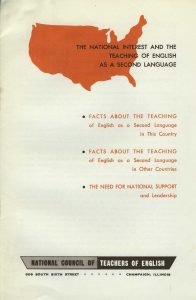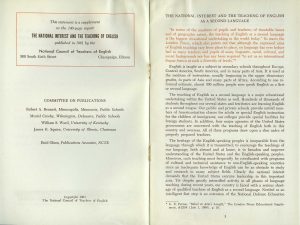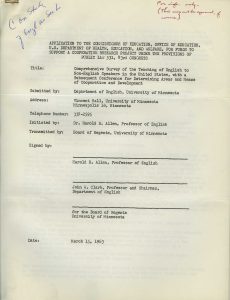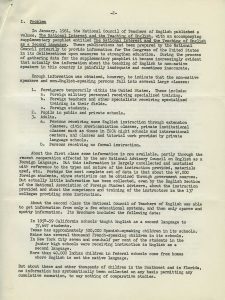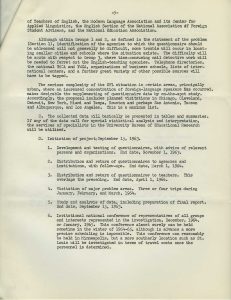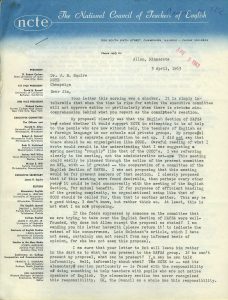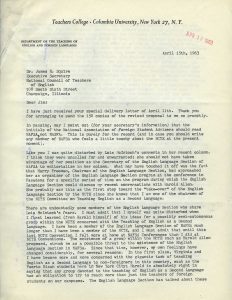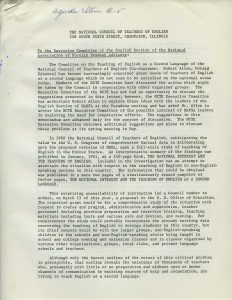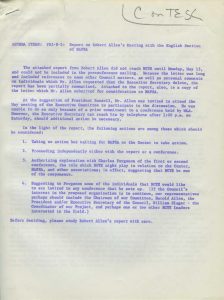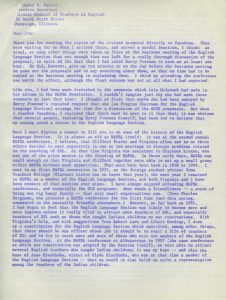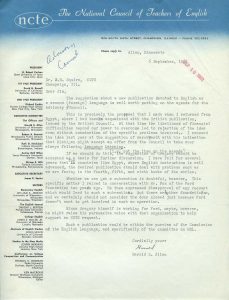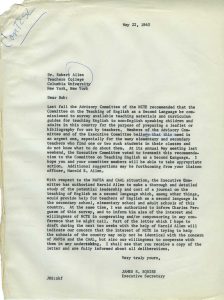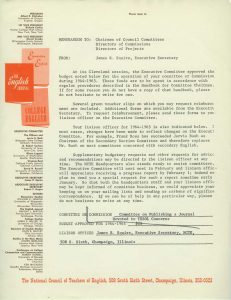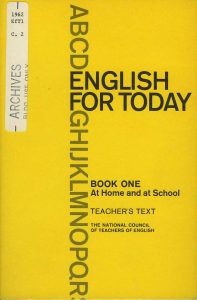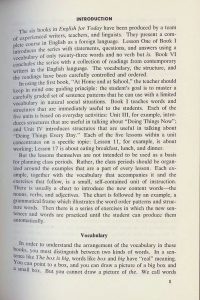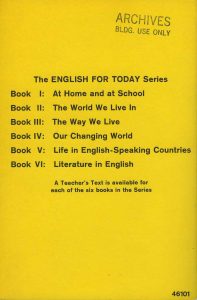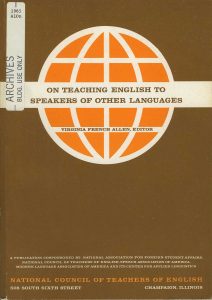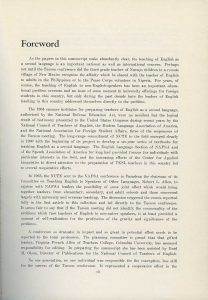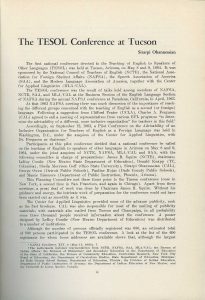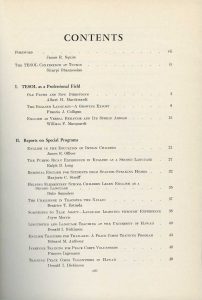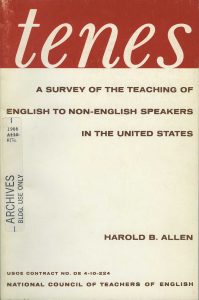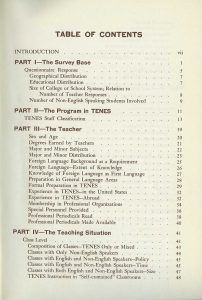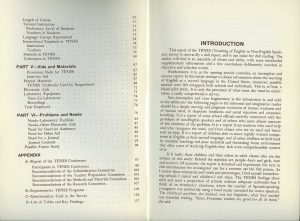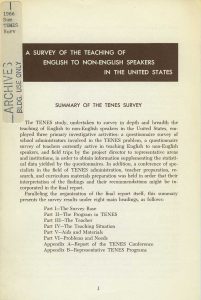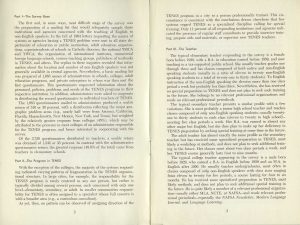“During the process of gathering data…it became increasingly evident that…information about the teaching of English to non-native speakers in this country is painfully inadequate and sometimes inaccurate”
From an NCTE proposal for the funding of a study and conference on teaching English as a second language (c. 1961)
In 1961, NCTE published The National Interest and the Teaching of English. According to J.N. Hook in A Long Way Together: A Personal View of NCTE’s First Sixty-Seven Years, this 140-page book was motivated in response to the National Defense Education Act, which supported the study of science, math, and foreign languages. The Council wanted to demonstrate that English was also vital to national security, sending free copies to Congress members and other government leaders. Accompanying this report soon after was a supplement that would mark the beginning of what would be a very active decade in moving forward on an oft-neglected subfield: the teaching of English as a second language.
NCTE’s heightened focus on English as a second language was in part due to James R. Squire, the new Executive Director in 1960, who was strongly interested in further advancing this field. Harold Allen and Robert Allen were also significant figures in promoting this subject. Harold Allen served as the senior consultant of the English for Today series and was heavily involved in the efforts of organizing the first national conference for the Teaching of English to Speakers of Other Languages (TESOL), while Robert Allen was the chair of NCTE’s Committee on Teaching English to Speakers of Other Languages and also involved in the TESOL conference. Squire took a special interest in NTCE’s TESOL committee, encouraging it to consider publishing a journal devoted to the subject, and, alongside Harold Allen and Robert Allen, also aiding in efforts in forming the TESOL conference.
Organizing the conference was no easy task. While the TESOL conference had challenges that all conferences face, it also faced a unique problem. The conference was a joint effort among NCTE, the Modern Language Association and the National Association for Foreign Student Affairs. The English Section of the National Association for Foreign Student Affairs was particularly concerned that the TESOL conference would become its own organization or a permanent part of NCTE, which could absorb its own members, small in number. Squire and Robert Allen feared that the English Section would withdraw its support as a consequence, suspecting that Harold Allen was seriously considering establishing an organization dedicated to TESOL concerns. The groups, however, reconciled in time and the first conference was held in Tucson, Arizona in 1964, and attended by an estimated 800 teachers. Harold Allen would go on to indeed help found an organization based on the conference, Teachers of English to Speakers of Other Languages (TESOL), which was officially established in 1966.
To learn more about NCTE’s early involvement in promoting scholarship on the subject of English as a second language, take a look at the featured topics below:
- The National Interest and the Teaching of English as a Second Language
- Proposal for a Comprehensive Survey and Conference on Teaching English to Non-English Speakers
- NCTE and the English Section of NAFSA (Association of International Educators)
- Report on the English Section
- Committee On Publishing a Journal Devoted to TESOL Concerns
- English for Today
- On Teaching English to Speakers of Other Languages
- The TENES Survey
The National Interest and the Teaching of English as a Second Language
The National Interest and the Teaching of English as a Second Language was a supplement to NCTE’s original study The National Interest and the Teaching of English. The pamphlet emphasized the need of research on teaching English as a second language, noting a shortage of qualified teachers in this area. Teaching English was critical to international understanding, the pamphlet stressed: “The heritage of the English-speaking peoples is inseparable from the language through which it is transmitted; to encourage the teachings of our language, both abroad and at home, is to broaden and improve understanding of the United States and the English-speaking peoples.” Learn more: 15/71/010
Item:
The National Interest and the Teaching of English as a Second Language (1961)
Proposal for a Comprehensive Survey and Conference
In 1963, Harold Allen submitted a proposal to the U.S. Office of Education to fund a comprehensive survey of the teaching of English to Non-English Speakers in the United States. The proposal also asked for funds for a subsequent conference, later known as the conference on the Teaching of English to Speakers of Other Languages. Allen presented statistics on how many international students there were in the United States and cited the need for more research to know how many non-native English speakers there were total in the country. Allen proposed a method of collecting this data, along with a subsequent conference to share and discuss the results. Learn more: 15/71/010
Item: Proposal for a Comprehensive Survey and Conference on Teaching English to Non-English Speakers(1963)
NCTE and the English Section of NAFSA
After the proposal, some concerns arose regarding Harold Allen’s ultimate intentions of the TESOL conference. The English Section of NAFSA was wary that NCTE was attempting to “take-over” the section, becoming the primary organization for those teaching English as a second language. Squire and Robert Allen suspected that Harold Allen wanted to establish an organization similar to the CCCC. In any case, Squire and Robert Allen rejected the idea of an NCTE-sponsored organization dedicated to English as a second language and sought to reassure the English Section that they were not intending to supplant it. Learn more: 15/71/010
Item: Correspondence (1963)
Report on the English Section
To allay the concerns of the English Section of NAFSA, a special meeting was held to address the issues and determine whether the section would participate or not in the conference. Robert Allen served as the representative for NCTE and wrote a report on his meeting. “It was obvious that several people…had been led to believe that my coming posed a threat to the English Language Section,” he wrote. Allen also provided a brief history on the Section. Despite this tension, NAFSA would go on to participate in the conference. Learn more: 15/71/010
Item: Report on Robert Allen’s Meeting with the English Section of NAFSA (1963)
Committee on Publishing a Journal Devoted to TESOL Concerns
In the midst of planning the conference, Jim Squire also pushed for a journal focused on teaching English as a second language. The Executive Committee of NCTE was intrigued by Squire’s proposal and authorized him “to make a thorough and detailed study of the potential leadership and cost of a journal.” In 1964, the NCTE established the Committee on Publishing a Journal Devoted to TESOL Concerns, with Squire serving as the liaison officer. While an official serial never came to fruition, NCTE published many monographs on the subject. Learn more: 15/71/010
Item: Correspondence (1962-64)
English for Today
The English for Today series, by William R. Slager and Luella B. Cook, were largely the result of Harold Allen’s work. According to J.N. Hook, “Allen…deserves most of the credit for this venture” (1979, p. 218). The six books essentially provided a complete course in English, with each one having its own theme. Hook further explained that the series, which was “used in dozens of countries,” also “demonstrated Council interest and competence in preparation of materials for teaching English to speakers of other languages” (p. 218). Learn more: 15/71/816
Item: English for Today: Book One: At Home and School (1962)
On Teaching English to Speakers of Other Languages
The first national TESOL conference took place May 8 and 9, 1964 and was sponsored by five organizations, including the NCTE, NAFSA, Speech Association of America, Modern Language Association of America, and the Center for Applied Linguistics. The series, On Teaching English to Speakers of Other Languages, served as a compilation of the papers read at the 1964, 1965, and 1966 conferences. “A conference so dramatic in impact and so great in potential effect needs to be reported to the total profession,” the first volume’s forward asserted. At the 1966 conference, attendees voted to officially establish the organization, Teachers of English to Speakers of Other Languages (TESOL). Learn more: 15/75/811
Item: On Teaching English to Speakers of Other Languages: Papers Read at the TESOL Conference, Tucson, Arizona, May 8-9, 1964 (1965)
The TENES Survey
Harold Allen was also the major force behind Tenes: A Survey of the Teaching of English to Non-English Speakers in the United States. This survey was instrumental to understanding more about non-native speakers living in the United States, namely who they were and what were their needs. The report began with a sardonic tone, listing its faults as a largely statistically-based study, “This…survey is outwardly a dull report, and it can make for dull reading.” However, it soon took a poignant turn: “Yet – incomplete and even fragmentary as the information is, and as cold as the tables are – the following pages to the informed and imaginative reader should be a deeply moving and poignant revelation of human weakness and of human need, of desperate loneliness and social rejection and economic handicap.” The study was published both as a book and pamphlet. Learn more: 15/71/824
Item: Copy of the book and pamphlet of Tenes: A Survey of the Teaching of English to Non-English Speakers in the United States (1966)
